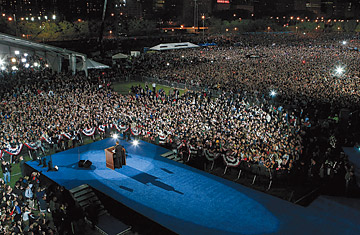
The scene in Chicago during the exuberance of election night 2008.
(5 of 5)
There are fault lines in the Obama coalition, to be sure. In a two-party system, it's impossible to construct a majority without bringing together people who disagree on big things. But Obama's majority is at least as cohesive as Reagan's or F.D.R.'s. The cultural issues that have long divided Democrats--gay marriage, gun control, abortion--are receding in importance as a post-'60s generation grows to adulthood. Foreign policy doesn't divide Democrats as bitterly as it used to either because, in the wake of Iraq, once-hawkish working-class whites have grown more skeptical of military force. In 2004, 22% of voters told exit pollsters that "moral values" were their top priority, and 19% said terrorism. This year terrorism got 9%, and no social issues even made the list.
The biggest potential land mine in the Obama coalition isn't the culture war or foreign policy; it's nationalism. On a range of issues, from global warming to immigration to trade to torture, college-educated liberals want to integrate more deeply America's economy, society and values with the rest of the world's. They want to make it easier for people and goods to legally cross America's borders, and they want global rules that govern how much America can pollute the atmosphere and how it conducts the war on terrorism. They believe that ceding some sovereignty is essential to making America prosperous, decent and safe. When it comes to free trade, immigration and multilateralism, though, downscale Democrats are more skeptical. In the future, the old struggle between freedom and order may play itself out on a global scale, as liberal internationalists try to establish new rules for a more interconnected planet and working-class nationalists protest that foreign bureaucrats threaten America's freedom.
But that's far in the future. If Obama begins restoring order to the economy, Democrats will reap the rewards for a long time. Forty years ago, liberalism looked like the problem in a nation spinning out of control. Today a new version of it may be the solution. It's a very different day in Grant Park.
Beinart is a senior fellow at the Council on Foreign Relations
